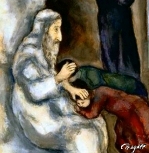|
WHEN JOSEPH BROUGHT HIS TWO SONS Manasseh (מְנַשֶּׁה) and Ephraim (אֶפְרָיִם) to his father for a blessing, Jacob told his grandchildren, "You will be counted just as my own children" (Jacob's "adoption" of these boys explains why Ephraim and Manasseh are counted among the twelve tribes of Israel). Joseph then placed Manasseh, his firstborn, opposite Jacob's right hand, and Ephraim opposite his left, but Jacob deliberately crossed his arms and put his right hand on the younger boy's head and his left hand on the older. He then proceded to bless his adopted sons: "The God before whom my fathers Abraham and Isaac walked, the God who has been my Shepherd (הָרעֶה) all my life long to this day, the Angel (הַמַּלְאָךְ) who has redeemed me from all evil, bless the boys; and in them let my name be recalled, and the name of my fathers Abraham and Isaac; and let them grow into a multitude in the midst of the earth..." (Gen. 48:15-16).
When Joseph saw this he was "displeased" and thought his father was perhaps confused. When he tried to forcibly switch his father's hands, Jacob said, "I know, my son, I know" (יָדַעְתִּי בְנִי יָדַעְתִּי). The younger brother shall become greater than the older one - zaro yeyeh melo hagoyim (זַרְעוֹ יִהְיֶה מְלֹא־הַגּוֹיִם) - "his seed shall become a multitude of nations." This statement has become foundational for the "Two House" theology that claims that Christians literally (rather than figuratively) are the ten lost tribes of Israel, though according to Jewish tradition, the greater blessing given to Ephraim was on behalf of Joshua, Moses' successor, who was a descendant of Ephraim that led the children of Israel into the Promised Land after the the Exodus from Egypt. Joshua's command of the tribes of Israel initially made the tribe of Ephraim the centralized power in the land of Canaan.
The tribe of Ephraim is later identified with the "House of Joseph" in the Scriptures, and later geographically controlled the earliest centers of worship in the Promised Land: Shechem and Shiloh. When the Ark was removed from Shiloh to Jerusalem during the time of King David, seeds of animosity were sown and Ephraim grew "jealous" of Judah's growing influence (2 Chron. 15:8-11). After the death of King Solomon, civil war caused the United Kingdom to be split into two main groups: the ten northern tribes (led by Jeroboam, an Ephraimite, who established rule at Shechem (1 Kings 12:25)), and the two southern tribes of Judah and Benjamin (led by Rehoboam, who ruled from Jerusalem).
Later on, the tribe of Ephraim so dominated the other northern tribes that it became synonymous with the Northern Kingdom of Israel itself, especially in the writings of the prophets. Eventually, after repeated prophetic warnings about the prevalence of "Baal worship," the Northern Kingdom was conquered by the Assyrians (c 722 BC), and the tribes were exiled. This has led to the idea of the "ten lost tribes" of Israel and the rise of various groups that have claimed that since Joseph's wife (Asenath) was an Egyptian (i.e., a Gentile), Ephraim metaphorically represents the "Gentile children of Israel." This viewpoint is now sometimes taught as the "Two House" movement, which uses the allegorical method of interpretation to (ironically) create a new form of "Replacement Theology"-- but this time in reverse (i.e., Israel replaces the Church).
Note: On erev Shabbat (and during a Brit Milah ceremony) it's customary to bless our sons with the blessing: יְשִׂמְךָ אֱלהִים כְּאֶפְרַיִם וְכִמְנַשֶּׁה - ye'simcha Elohim ke'Efrayim ve'khe-Menasheh - "May God make you like Ephraim and like Manasseh." This comes from Moses' comment regarding Jacob's blessing imparted to his adopted sons: "By you Israel will pronounce blessings, saying, 'God make you as Ephraim and as Manasseh'" (Gen. 48:20). Some of the sages have said that since these boys were born away from the Promised Land (and therefore never directly knew their grandfather Jacob), they represent Israel in exile, and the blessing is one of preservation for the Jewish people. Figuratively, as "adopted sons of Israel" and partakers of the covenants given to the Jewish people (Eph. 3:6), Christians can take comfort using this blessing, too.
Hebrew Lesson
Genesis 49:20b reading (click):
 |
|



